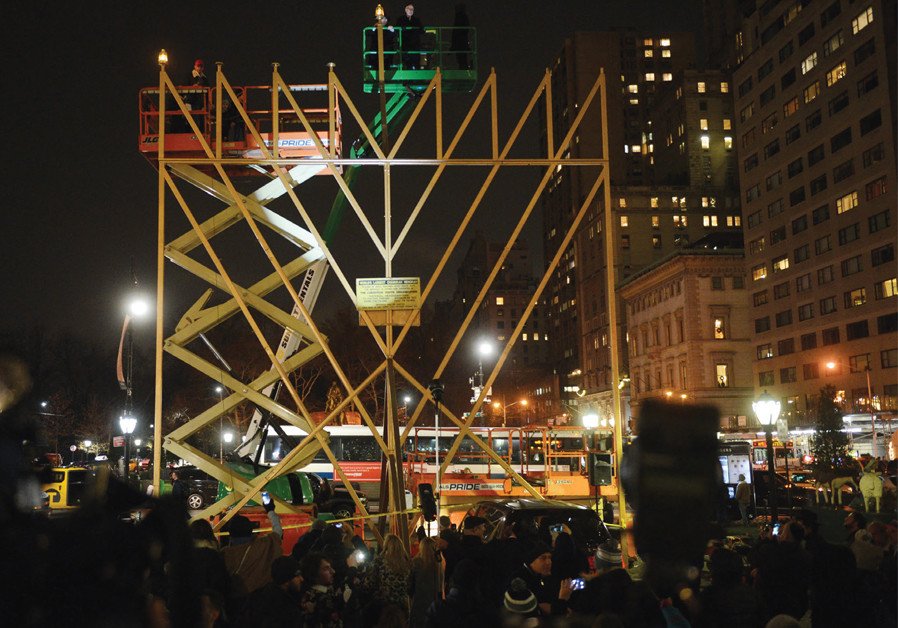Unorthodox Judaism in the U.S. and the ‘criteria’ of identifying as Jewish

A RABBI lights the ‘World’s Largest Menorah’ in Manhattan in 2017.. (photo credit: ANDREW SAVULICH/TNS)
In the 21st century, the criteria for identifying a Jew remains contested. In the United States, Robert Mnookin points out, several critical challenges add a sense of urgency to the age-old debate.
Nearly half of American Jews are agnostics or atheists; 22% never and 19% seldom attend religious services; two-thirds see no conflict in being Jewish and not believing in God. While the United States is by no means free of antisemitism, the decline of institutionalized discrimination removes a “potent reminder” of Jewish identity. Many American Jews do not approve of Israel’s “occupation” of the West Bank, and since the year 2000, 58% of Jews who married chose a non-Jewish spouse.
In The Jewish American Paradox: Embracing Choice in a Changing World, Mnookin, a professor and chair of the program on negotiation at Harvard Law School, draws on Jewish history, halachic standards and customs; on the stories of Erik Erickson, Madeleine Albright, and Brother Daniel (a Jew by birth, who converted to Catholicism, asked to immigrate to Israel under the Law of Return and be registered as a Jew by nationality and a Catholic by religion), and his own experiences (as an agnostic who embraced his Jewishness rather late in life) to examine the meaning of Judaism.
Mnookin acknowledges that “religious commitment is a powerful identity anchor.” He maintains, however, that mandating adherence to Judaism as a religion as the sole criterion for Jewish identity will not work. After all, “born Jews” are not required to be religiously observant and conversion “is a formidable barrier to entry.” He rejects as well the ascribed status of the matrilineal rule, arguing that it produces “arbitrary and irrational results.”
Convinced it is impossible “to draw one bright line” acceptable to virtually everyone that divides Jews from non-Jews and laying out what it means to be Jewish, Mnookin proposes a simple – and certain to be controversial – two-part “big tent” standard, based on individual choice rather than descent. Any persons willing to identify themselves publicly as Jews, he suggests, should be welcomed into the American Jewish community. The decisions of those who were “born Jewish” but do not consider themselves Jews, such as Erickson and Albright, to opt out, should be respected. At the same time, every Jewish organization and group should be free to set its own requirements for membership and participation.
An Orthodox synagogue, for example, could turn away a person who did not embrace halachic standards. Conservative or Reform congregations could accept or reject children of intermarriage; non-Jewish spouses raising Jewish children; people with “remote” Jewish ancestry; or individuals, like Brother Daniel, who are Jewish by birth, consider themselves ethnically Jewish and have ties to another religion.
Self-identification, without a sense of shared mission, Mnookin admits, is “pretty thin.” But, he claims, the concept of voluntary “peoplehood” is not devoid of content. Most of its proponents agree on its principal precepts: inclusiveness; unity; a shared past and future; individual and collective responsibility to combat antisemitism and assist Jews in need; and support for the State of Israel.
These precepts, he hastens to add, are aspirational. Despite his emotional commitment to Israel, for example, Mnookin refuses to be “cowed” by Jews who believe in “Israel right or wrong.” Standing “squarely” with J Street, he is “appalled” by the Israeli government’s policies of settlement expansion, continued occupation, treatment of Palestinians, and its role in allowing Orthodox rabbis to be the gatekeepers of Jewish identity.
Unlike many observers, Mnookin is not convinced that intermarriage poses an existential threat to Judaism in the United States. Citing a recent survey finding that over time, a rising share of adult children of intermarriage are identifying as Jews, with younger respondents even more likely than the previous generations to identify as Jewish by religion, he suggests that outreach by Jewish institutions, and even more importantly, socialization by parents, are having an impact. Ironically, Mnookin, the agnostic, recommends that the momentum is more likely to be sustained if families celebrate Shabbat and Jewish holidays in the home, affiliate with a temple or synagogue, send kids to Hebrew school and Jewish summer camps, extend religious education past the bar/bat mitzva, encourage enrollment in Jewish Studies courses in college and Birthright excursions to Israel.
Mnookin envies Jews who “find deep meaning, comfort and strength in their religious faith.” For him, Judaism is meaningful because of its commitment to the life of the mind; the obligation to pursue social justice and make the world a better place; and its rich and remarkable heritage. “Instead of something one is,” he writes, Jewish identity should involve “something one actively does.”
He cannot be certain, of course, that his self-evidently secular approach will work. He is surely right, however, to challenge us to ask ourselves why our Jewish identity is important – and how it affects our beliefs and behavior.
Glenn C. Altschuler is the Thomas and Dorothy Litwin professor of American Studies at Cornell University.
A RABBI lights the ‘World’s Largest Menorah’ in Manhattan in 2017.
(Andrew Savulich/TNS)
THE JEWISH AMERICAN PARADOX
By Robert Mnookin
PublicAffairs
320 pages; $28
Join Jerusalem Post Premium Plus now for just $5 and upgrade your experience with an ads-free website and exclusive content. Click here>>






Comments are closed.